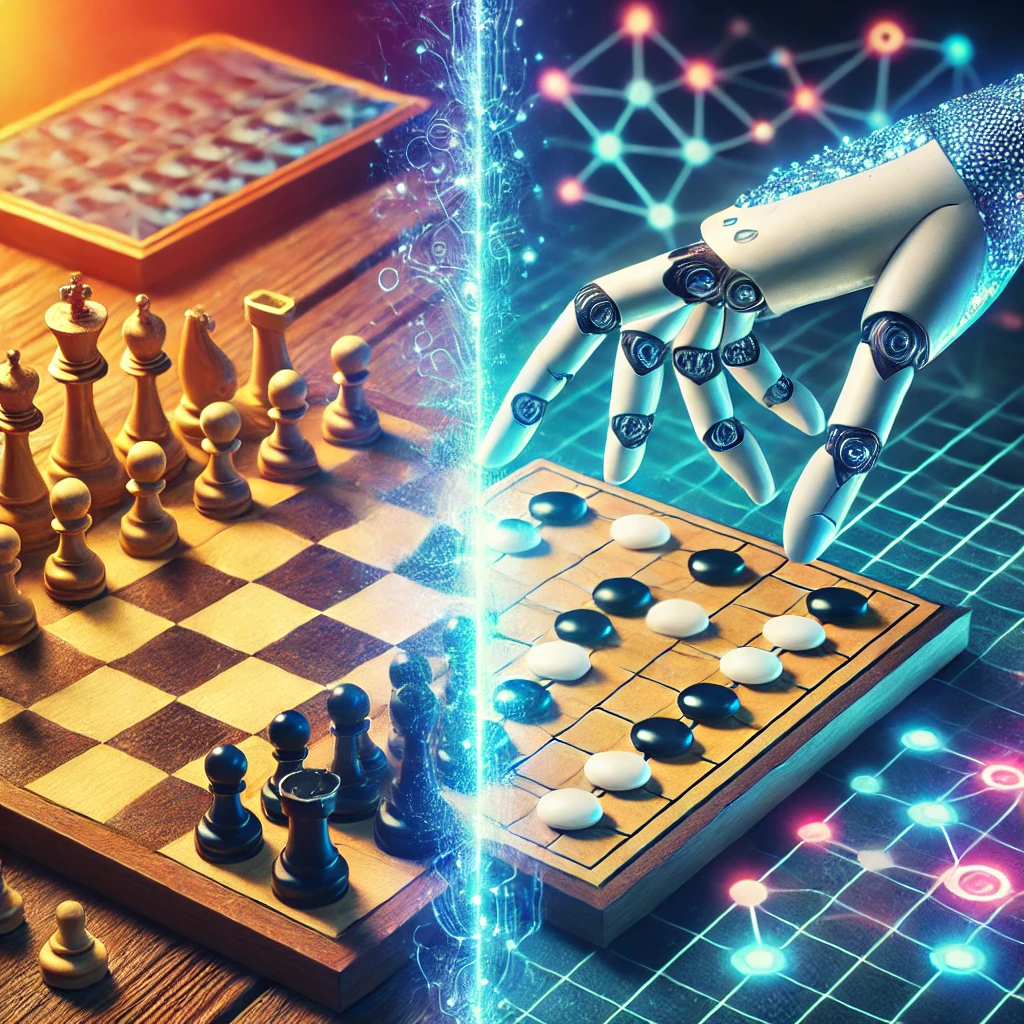The Evolution of Artificial Intelligence: From Computer Chess to AlphaGo
In the world of artificial intelligence, few stories are as compelling as the journey from computer chess to AlphaGo. This tale is not just about machines conquering complex games; it is about humanity’s relentless pursuit of innovation and understanding, culminating in breakthroughs that reshape how we think about intelligence itself.
The Dawn of Computer Chess
The roots of computer chess stretch back to the mid-20th century, where the seeds of artificial intelligence were planted by visionaries like Alan Turing. He dreamt of machines not just as calculators but as entities capable of thinking strategically, mimicking the intricacies of human thought. This dream birthed an intellectual race to conquer one of humanity’s most revered games. The challenge was clear: chess, with its vast possibilities and need for strategic thinking, was the perfect proving ground for artificial intelligence.
By the 1980s, the dream began to materialize. Programs like Deep Thought emerged, signaling a new era where machines could match wits with strong human players. These systems were not just tools but challengers, daring humans on their own intellectual turf. The defining moment, however, came in 1997 when IBM’s Deep Blue defeated the reigning world chess champion, Garry Kasparov, in a six-game match. Deep Blue’s triumph was a watershed moment, capturing global attention as it became the first machine to topple the king of chess in a structured battle of wits. It demonstrated that sheer computational power, when paired with clever heuristics, could dismantle even the most intuitive and strategic human approaches.
Deep Blue’s approach was unapologetically forceful. It evaluated millions of positions per second, leveraging a vast database of chess knowledge, including meticulously crafted openings and endgames. Unlike AlphaGo’s adaptive learning, Deep Blue relied on a brute-force search of possibilities, emphasizing computation over discovery and creativity, which limited its ability to generalize beyond chess. It was less an artist and more a relentless machine of logic, single-mindedly exploiting every computational edge in its quest for victory. In contrast, AlphaGo relied on deep reinforcement learning and neural networks, allowing it to learn dynamically and adaptively, rather than relying on pre-programmed rules and exhaustive search. However, while undeniably impressive, Deep Blue’s approach was firmly rooted in symbolic AI—rule-based systems that relied on human-crafted algorithms and data. It was an expert in chess but lacked the adaptability to tackle other domains.
Enter AlphaGo: A Paradigm Shift
Two decades after Deep Blue, a new challenge loomed: the ancient Chinese game of Go. Unlike chess, Go’s simplicity in rules belies its extraordinary complexity. The board’s 19×19 grid offers a branching factor of over 250 possible moves per turn, compared to chess’s 35. The number of possible board configurations in Go exceeds the number of atoms in the universe, making it a game of boundless possibilities.
Enter AlphaGo, developed by DeepMind, a subsidiary of Google. The year 2015 marked a pivotal moment when AlphaGo defeated the European Go champion, Fan Hui. This victory challenged the prevailing notion that Go’s complexity made it impervious to AI mastery. By tackling Go, with its immense branching possibilities and strategic depth, AlphaGo demonstrated that AI could transcend traditional limitations, setting the stage for its groundbreaking encounter with Lee Sedol. This victory wasn’t merely a technical milestone; it signaled a new era—the realization that AI could excel in domains requiring a blend of intuition and abstract thinking, far beyond traditional computational boundaries. The triumph shattered long-held beliefs about Go’s invincibility to machines and paved the way for a showdown that would captivate the world.
In 2016, AlphaGo faced Lee Sedol, a titan of Go and a player revered for his creativity and strategic depth. In a five-game match that blended drama with brilliance, AlphaGo emerged victorious, winning 4–1. One move in particular—”Move 37″ in game two—left commentators and players alike in awe. This move, an unorthodox and seemingly counterintuitive placement, defied conventional Go wisdom but ultimately proved pivotal in securing the game. It showcased AlphaGo’s ability to think beyond human-established norms, embodying a kind of creativity and vision previously thought to be uniquely human. This match was not just a victory for AI; it was a redefinition of how games, intelligence, and creativity could be perceived.
What Made AlphaGo Revolutionary?
AlphaGo’s groundbreaking success stemmed from its novel approach to AI. Unlike chess engines, which relied on human-curated knowledge and pre-programmed rules, AlphaGo harnessed deep reinforcement learning and neural networks to independently discover and adapt strategies. These technologies allowed it to learn and adapt dynamically:
- Policy Network: Suggested probable moves based on the current board state.
- Value Network: Evaluated the likelihood of winning from any given position.
- Self-Play: AlphaGo trained itself by playing millions of games, refining strategies without human intervention.
In 2017, DeepMind introduced AlphaGo Zero, an even more advanced version that started with no prior knowledge of Go, meaning it was not trained on human games or strategies. Instead, it began with only the rules of the game and learned entirely by playing against itself, iterating and improving through reinforcement learning. Through self-play alone, AlphaGo Zero achieved superhuman performance in just a matter of days, discovering strategies that astonished even seasoned Go experts. Unlike traditional training methods that rely on human input or pre-curated data, self-play allows AI to explore the game’s possibilities independently, iteratively improving by testing and refining its own strategies. This groundbreaking approach enables the AI to uncover novel insights and reach levels of mastery unencumbered by human biases or limitations. This was intelligence unbound by human constraints, capable of forging its own path.
The Differences Between Computer Chess and AlphaGo
The contrast between computer chess and AlphaGo highlights the evolution of AI:
- Complexity: Chess AI thrives on symbolic intelligence and brute-force calculation. Go required intuitive, adaptive learning due to its vast complexity.
- Learning Process: Chess engines like Deep Blue relied on human-curated data, while AlphaGo learned autonomously through self-play.
- Impact: While chess engines remained domain-specific, AlphaGo’s techniques—deep learning and reinforcement learning—opened doors to applications in healthcare, logistics, and beyond.
Theoretical Achievement of Mastery and Perfection
The triumphs of Deep Blue and AlphaGo go beyond mere victories in their respective games. They represent a theoretical achievement of mastery—the idea that machines can approach, and perhaps even achieve, perfection within structured domains. AlphaGo Zero epitomizes this concept, starting from nothing but the rules of Go and evolving through millions of self-play games to reach a level of skill that no human or traditional AI could match.
In Go, perfection is an elusive goal due to the game’s immense complexity. Yet, AlphaGo Zero’s ability to discover entirely new strategies suggests it is approaching an optimal level of play, mastering patterns, and tactics beyond human comprehension. This achievement raises profound questions: can AI reach a definitive “perfect” state in such games, and how do we define perfection in a realm where creativity and intuition play such a vital role?
Similarly, in chess, modern engines have surpassed human players by leveraging near-perfect calculation and strategic insight. These advances point toward an AI-driven pursuit of perfection, where machines can explore every possibility, redefining mastery itself.
Beyond Games: The Legacy of AlphaGo
AlphaGo’s triumph is more than a story of AI mastering a game. It represents a shift in our understanding of intelligence itself. The techniques pioneered by AlphaGo—neural networks, reinforcement learning, and self-play—are now driving advancements in fields as diverse as medical research, climate modeling, and robotics.
Moreover, AlphaGo inspired a broader philosophical reflection: what does it mean to create something that exceeds human understanding? This question extends far beyond games, influencing real-world applications where AI is already reshaping industries—from revolutionizing medical diagnostics to streamlining global supply chains with unprecedented precision. At the same time, it raises ethical considerations: as AI develops unprecedented autonomy, how do we ensure it aligns with human values? These reflections challenge us to think not just about what AI can achieve, but about the responsibility that comes with such power. Its moves, at times incomprehensible to humans, remind us that intelligence need not mimic our own to be effective.
Conclusion
From the rule-based brilliance of computer chess to the adaptive creativity of AlphaGo, the journey of AI in games reflects humanity’s quest to push boundaries. As we continue to explore the potential of artificial intelligence, we are not just building better machines; we are uncovering new ways to understand the universe—and ourselves.
The future of AI is unwritten, but if the stories of computer chess and AlphaGo teach us anything, it’s that the possibilities are as vast and complex as the games we dare to master. These breakthroughs suggest transformative potential in personalized education, precision medicine, and sustainable energy—areas where AI could create profound societal impacts. By harnessing the principles of deep learning and adaptability, AI could reshape industries, solve global challenges, and unlock insights into problems we have yet to define.

